Cultivate a Powerful Employer Brand Strategy That Attracts Top Talent
In today’s competitive job market, having a powerful employer brand is crucial to attract top talent. With the advent of social media, candidates now use job comparison sites to research a company before applying or taking a job. Just like searching for reviews to get the best pizza, it’s always better to be safe than sorry, right?
The traditional approach of offering high salaries is no longer enough. Today’s employers must proactively try to attract and engage the best talent through their own reputation.
With some 82% of job seekers considering employer brand when applying, most companies have a strategy for it. Read on to find out how to develop an employer branding strategy to attract and retain staff.
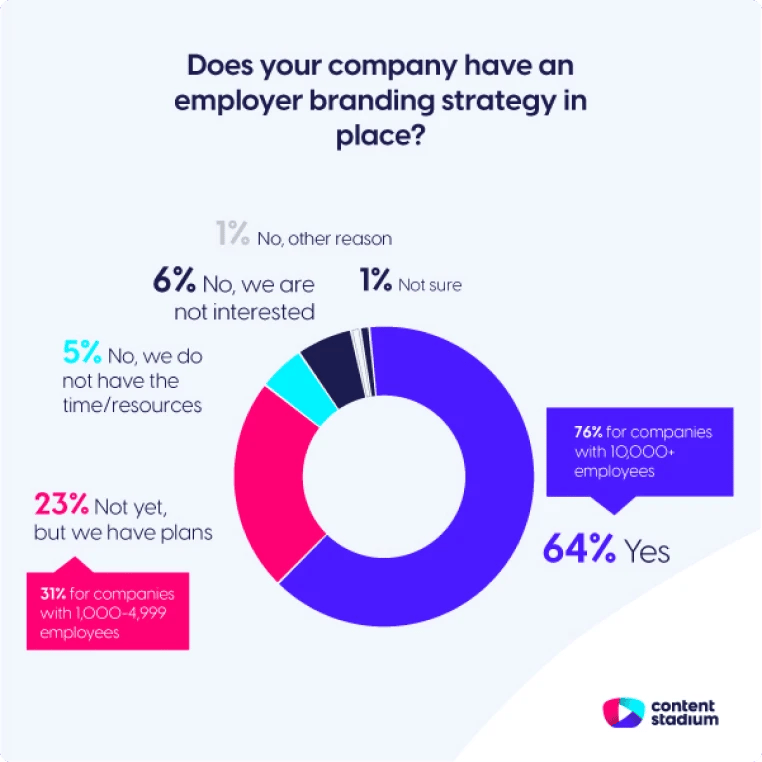
Source: Content Stadium
What Is Employer Branding?
Employer branding is how you market your company to job seekers. Effective employer branding positively promotes a company’s culture, values, and the employee value proposition (EVP). An employer brand refers to the feeling that potential candidates have about a company.
Staying informed about landscape industry trends can help your company adapt to the ever-changing job market and maintain a strong employer brand. For example, asynchronous collaboration, which allows employees to work together on projects at different times and locations, can be an attractive feature of your company culture for potential candidates.
You don’t want a situation in which the culture and values of a company are just words on an application form; it must also be embodied in how your company and employees act. If a company promises real human interaction when a customer calls, then they should employ staff members who are dedicated to providing excellent customer service. If that’s not feasible, one option is to outsource this to an international calling company.
In short, this is the story you want to have told by your employees.
The Benefits of Employer Branding
Since the arrival of online jobs boards in the mid-1990s, a company’s online reputation has become a crucial factor in attracting and retaining top talent. With the ability to apply to opportunities worldwide from the comfort of their homes, this has made the job market more competitive, and the traditional philosophy of staying with one company has eroded. Instead, candidates are more likely to explore and pursue better opportunities.
Companies need to practice digital empathy and nurture their employer brand, which brings many benefits such as:
Business Friendly Reputation
Promoting your employer brand not only helps you attract top talent, it also helps spread the word about your brand including its products, services, team culture, and more. This is an incredibly powerful force in making you seem the best company on the block to do business with. What would your staff say if asked, “What’s it like working there?” If the answer is positive, you will potentially create sales, save money on marketing, and attract and retain the best staff.
Strong Company Culture
70% of consumers think it’s important that companies make the world a better place, and so do your employees. If you don’t offer a positive culture based on a powerful employer brand, then don’t expect the top talent to apply (or stay). Most candidates want to learn about your culture and value before applying, and that is why 75% of job seekers consider a company’s reputation before applying.
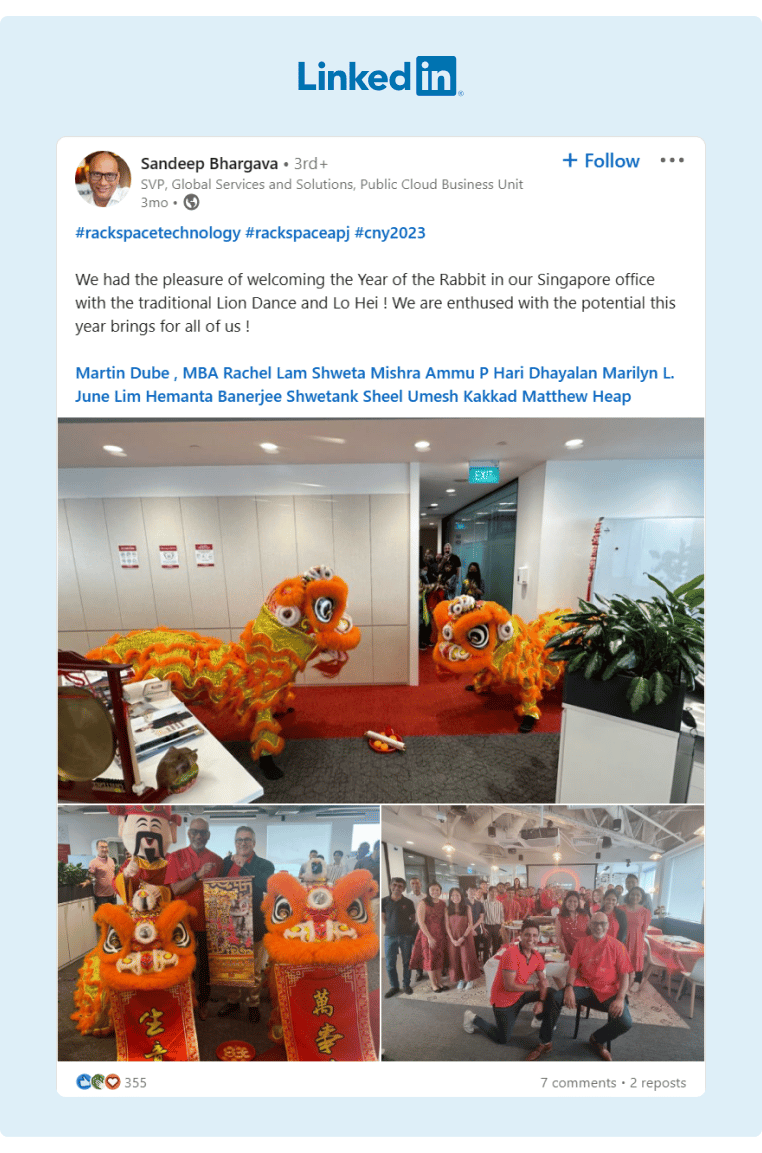
Positive Brand Image
Successful candidates are likely to reject an offer from a company who has a poor employer brand. If you nurture a positive brand image, you will attract top talent. If you have a bad reputation, job seekers simply won’t apply.
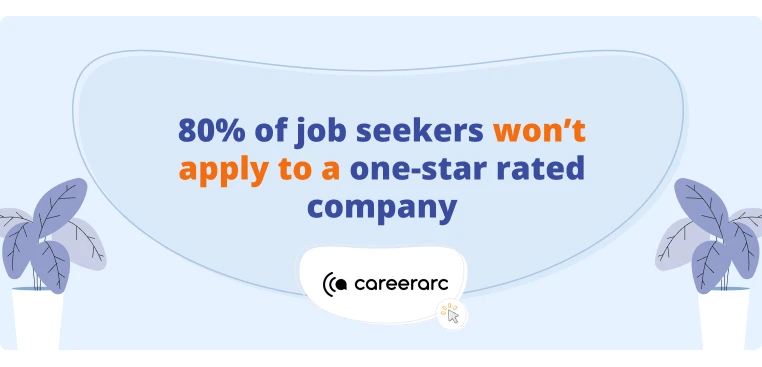
Source: CareerArc
Brand Talent Acquisition
Did you know a negative employer brand (or non-existent) can cost a company 10% more per employee hired?
A strong employer branding strategy can have a positive impact on your brand talent acquisition by attracting the best talent and saving you money while doing so. When employer branding is strong it can result in happier employees who, in turn, become ambassadors. As good employee referrals come in, the company can save time and money on recruiting costs.
Promoting a company’s perks and benefits can also help with salary costs, too. 67% of candidates would accept a lower salary if the company had positive online reviews. And by providing a suitable EVP, 76% of candidates cite the opportunity to learn new skills to develop their career as making them more likely to apply.
How To Create an Effective Employer Branding
Ready to create an effective employer branding? Here are four tips to achieve effective employer branding.
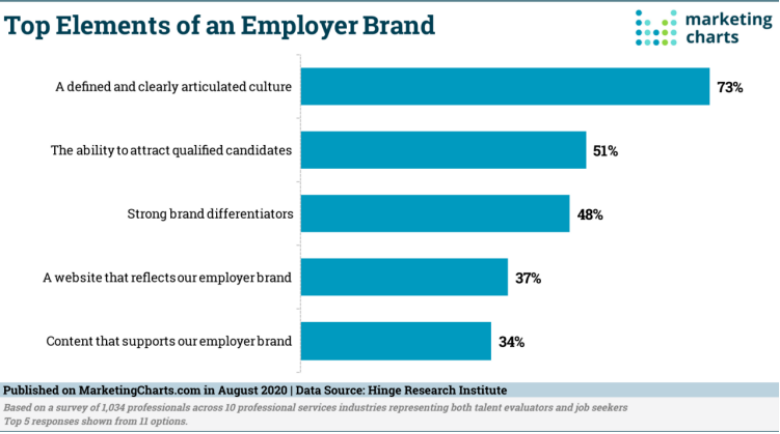
Source: Hinge Marketing
1. Analyze Employee Experience and Company Culture
On your company website, your career page is where candidates will go to learn about your company and job openings. Whether you’re building out your career page for the first time, or making some updates, make sure that your site is easy to navigate and optimized for mobile devices.
Next, highlight why your company is a great place to work by including an overview of your company culture and perks. For job postings, when describing the open position(s) try to be as transparent as possible. If you can divulge a salary range plus benefits great, that will go a long way with applications. Also, take into consideration the job application process. Lengthy application forms (and technical issues) can make people abandon a job application altogether.
Tip: Try completing your own application form as a candidate to see if it’s frustrating or engaging, and make adjustments if needed.
Make sure candidates know what the recruitment process entails and feel supported throughout it. Consider how you will respond to your applicants (e.g., via phone or email). If you are worried your business can’t handle the flow of candidates, consider using a business phone system.
2. Develop Employer Brand Culture
29% of job seekers use social media as their primary job search tool. It is essential to focus on making your employer brand stand out on social platforms that are relevant to your target audience. Publish content that is relevant and offers a glimpse into your office and company culture. Types of content can include surveys, videos, e-books, blog posts, employee testimonials, and company awards or milestones.

Consider leveraging employee advocacy, too, to help promote your brand. It’s an effective tool because people value the recommendations and opinions of friends and employees more than the brand’s. Which brings us to…
3. Create an Employee Advocacy Program
An employee advocacy brand is a great way to nurture your employer brand. An excellent employer brand has passionate employees who can give testimonials of what life is really like on the inside, making them more credible than corporate messaging.
Consider featuring employee-generated content such as “A day in the life of,” “Why I applied,” and “Why working here is different” thus encouraging employee engagement.
4. Test and Measure Employer Branding
To make sure your employer branding is effective, here are some key performance indicators (KPIs) to measure:
Retention Rate
A LinkedIn study highlighted retention as the most important ROI metric to measure employer brand. Retaining your staff is not just great for your advocacy, it saves you time and money spent on recruiting, hiring, and training new staff. A low turnover rate is a good sign that you have a strong employer brand.
If you find that your turnover rate is high, conduct interviews with current staff to better understand how they view the company, and make improvements as needed.
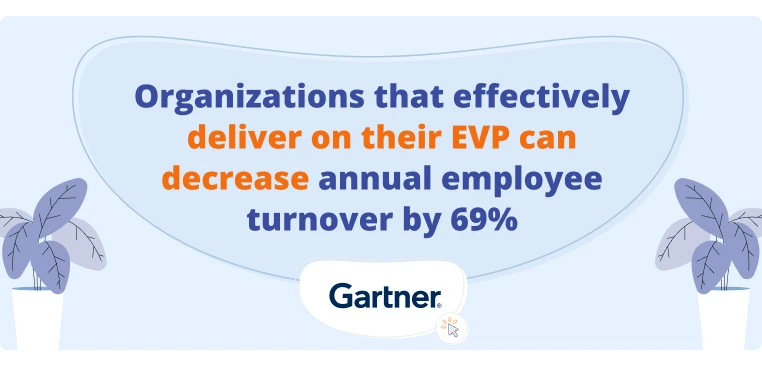
Source: Gartner
Employee Satisfaction
Employee satisfaction will affect what your employees tell potential candidates (and clients) about your company. An employee’s job satisfaction is based on several factors: compensation, benefits, opportunities for professional growth, recognition, etc.
Encouraging career development is a great way to engage staff and make them feel a valued part of the team. With remote work on the rise, it might be worth exploring remote desktop versus VNC solutions to give your employees the best possible work from home experience.
Encouraging career development is another way to ensure that your staff feels valued. You can also recognize success in non-financial ways that foster recognition of good work: newsletters, awards, and staff meetings are a great way to nurture this.
Employee Hiring
Human Capital Management software is a tool that brands can use to establish which recruitment channels are most effective, which is helpful for hiring. Analyzing job descriptions, career pages, social media content, and rejection letters can also help you gather useful insights. Feedback collection through surveys or a cloud contact center solution helps you understand their experience and decision-making, so you can identify reasons why some candidates accept job offers, or employees leave your company.
To gather meaningful data, it is essential to ask concise questions, without overwhelming your respondents or yourself with information overload. Consider dedicating an employee to get a data engineer certification to make sure your company is equipped to deal with this.
Understanding your candidate demographic and what they think about your business will make it easier to set your own goals. Maybe you have found that your social media presence is not as strong as you thought, so the young talent you crave just is not inspired to join your company.
Conclusion
53% of employees consider leaving their jobs. Retaining and attracting new talent is incredibly important. This can be achieved through analyzing your employee experience, making your culture clear and developing this online through your job adverts, social media and content. For this to work, you must live and breathe what you say, and make your employees your ambassadors.










